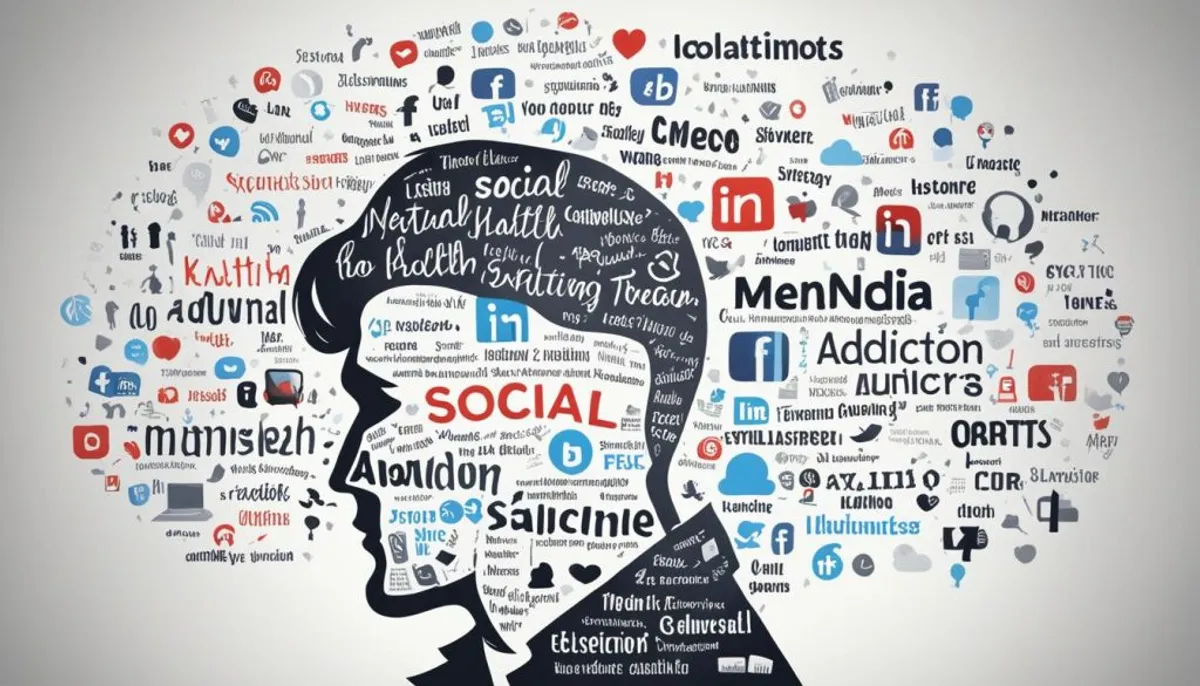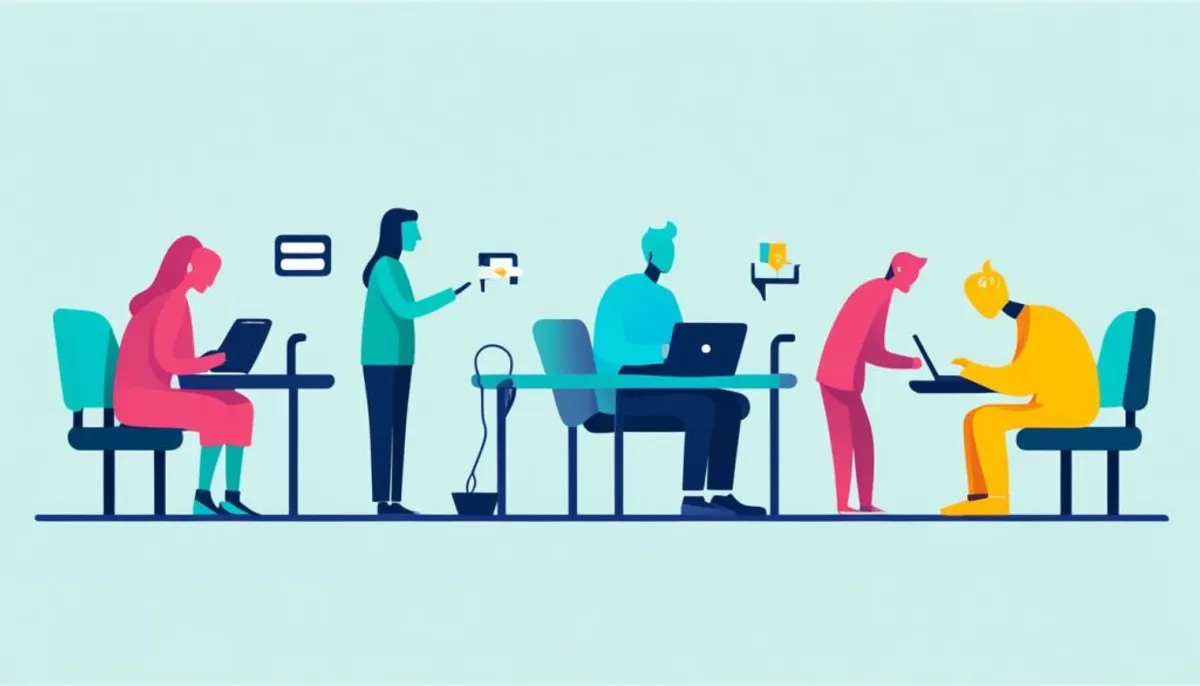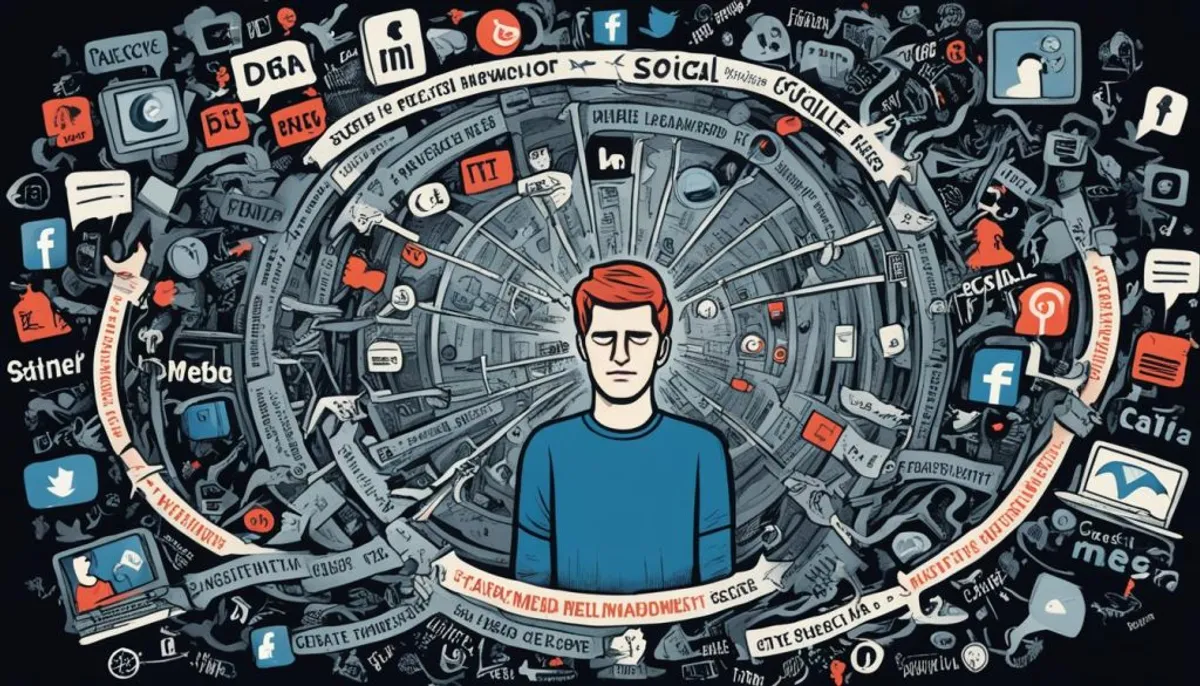Social media is a big part of our lives today. It connects us in ways we never thought possible. But, it also has a dark side that many ignore. Issues like social media addiction and harm to self-esteem and body image are becoming clear.
More people are getting addicted to social media. They can’t stop looking at their feeds and checking for updates. This addiction messes with our work and personal life. It also hurts our mental health as we try to keep up with online trends.

Social media also hurts our self-esteem and body image, especially in young people. Seeing perfect images online makes us feel bad about ourselves. To combat these issues, it's essential to explore social media marketing tips that promote positive content. This can really harm our mental health.
We need to understand the downsides of social media. It’s important to take steps to protect ourselves. By being aware of these issues, we can use social media better. This helps us stay healthy in our personal and work lives.
The Rise of Social Media Addiction
Social media has grown fast, causing a rise in its negative effects. One big issue is social media addiction. People are getting hooked on these platforms, spending too much time online.
This addiction affects mental health a lot. Studies show it can lower self-esteem and cause body image problems. Users often compare themselves to others online, feeling not good enough. This hurts their well-being.
Decreased Self-Esteem and Body Image Issues
Seeing perfect lives on social media can make people feel bad about their own. They might think they don’t measure up. This can make self-esteem drop and lead to bad feelings about their bodies.
| Potential Impacts of Social Media Addiction | Percentage of Users Affected |
|---|---|
| Decreased self-esteem | 60% |
| Body image issues | 45% |
| Increased social comparisons | 75% |
Social media’s addiction potential and its effects on self-esteem and body image are big concerns. We need to tackle these issues in our digital world.
Digital Divide and Unequal Access
In today’s digital world, the social network svantaggi go beyond just the platform. The digital divide is a big issue. It’s the gap between those who have digital tech and those who don’t. This unequal access to the internet and digital tools makes some people and groups fall behind.
The digital divide shows up in different ways:
- Geographical disparities: Some areas, like rural or less developed places, don’t have good internet access.
- Socioeconomic barriers: The cost of devices and internet can be too high for low-income families.
- Demographic divides: Things like age, education, and disability can affect how well someone can use digital tech.
The effects of the digital divide are big. Without access, people might not get the education or job chances they need. They could also miss out on important services like healthcare and government info. This makes it hard to break the cycle of unequal access, and it highlights the importance of cultural connectivity in bridging these gaps.
| Indicator | United States | Global Average |
|---|---|---|
| Household internet access | 79.2% | 57.4% |
| Individuals using the internet | 87.3% | 51.4% |
| Broadband subscriptions per 100 inhabitants | 33.1 | 15.2 |
Fixing the digital divide is key for progress. It helps empower those who are left behind. It also reduces the social network svantaggi linked to unequal access.

social network svantaggi: Privacy Concerns and Data Exploitation
In today’s digital world, social media has raised big worries about privacy and data exploitation. These platforms collect and use our personal info, likes, and online actions. They do this for ads and other business goals, often without us knowing or agreeing. This can break our privacy and misuse our sensitive data.
The good things about social network svantaggi come with big worries about privacy concerns and data exploitation. Many social media sites are not clear about how they use our data. They make money by targeting ads to us, which makes us uneasy about our personal info being sold.
Also, the more we use social network svantaggi linked to data exploitation, the more we worry about ethics and laws. Experts talk about the dangers of data exploitation. These include identity theft, fraud, and social bias from our profiles.
| Privacy Concern | Potential Impact |
|---|---|
| Lack of Transparency in Data Collection | Uncertainty about how personal information is being used and shared |
| Monetization of User Data | Commercialization of personal information and potential for exploitation |
| Risks of Data Breaches | Exposure of sensitive information and increased vulnerability to identity theft and fraud |
As social network svantaggi linked to privacy concerns and data exploitation grow, we must stay informed. We need to push for better data privacy laws and more user control. This way, we can make sure social media’s perks don’t harm our svantaggi of privacy and data safety.
The Spread of Misinformation and Cyberbullying
In today’s digital world, social networks have grown fast. They spread false information and cyberbullying quickly. These platforms let fake news spread, causing divisions and hurting trust in real news.
False information, often as fake news, can harm society a lot. It weakens public talks and makes people more divided. Users see lots of sensational or made-up stories, which can change how they think and decide.
Online Harassment and Toxic Behavior
Social networks also help cyberbullying and online harassment grow. Being anonymous online makes some people act mean, targeting those who are easy to hurt. They share hurtful or biased stuff without fear.
Cyberbullying and online harassment can really hurt people. It can make them feel bad about themselves, have mental health problems, or even get hurt. We need to work together to fix this. This means making rules for platforms, teaching users, and creating a kinder online place.
| Key Issue | Impact | Potential Solutions |
|---|---|---|
| Misinformation | Erodes public trust, fuels societal divisions | Fact-checking, media literacy education, platform policies |
| Cyberbullying | Negative mental health effects, low self-esteem | Robust reporting systems, user education, community-based initiatives |

We need to deal with the downsides of social networks. Misinformation and cyberbullying are big problems. We must work to make the internet safer, more welcoming, and trustworthy for everyone, while also embracing the vibrant kalamazoo social scene that can foster positive connections and community engagement.
Time-Wasting Tendencies and Productivity Drain
In today’s digital world, social media’s constant pull can cause us to waste a lot of time. This leads to a drop in productivity, both at work and in our personal lives. People often spend too much time scrolling through feeds, leaving important tasks undone.
This habit can make us less productive. The desire for updates, likes, and comments distracts us from our goals. It pulls us away from what we should be focusing on.
- Using social media too much can make us put off tasks and lose focus.
- Always checking for notifications can break our concentration and disrupt our work.
- Scrolling endlessly and browsing without purpose can cut into the time we have for important work.
The downsides of social media, like wasting time and hurting productivity, can be big. People might miss deadlines, ignore their duties, and not reach their goals.
| Time Spent on Social Media | Productivity Impact |
|---|---|
| Less than 30 minutes per day | Minimal impact on productivity |
| 1-2 hours per day | Moderate impact on productivity |
| More than 3 hours per day | Significant impact on productivity |
To fight the downsides of social media, like wasting time and hurting productivity, we need to be aware of our habits. We must find ways to manage our social media use better.
Conclusion
Social media has many benefits like better communication and easy access to information. But, we must also look at the downsides. Issues like social media addiction, low self-esteem, and social media iran, as well as privacy concerns, show we need a balanced approach to online platforms.
By understanding these problems, we can find ways to lessen their effects. This could mean better social media habits, improving digital skills, and making privacy safer. We should push for more honest and open tech practices too.
The aim is to use social media in a way that makes our lives better, not worse. By tackling the issues and finding solutions, we can make the internet safer and more in line with our values. This will help create a digital world that’s welcoming and secure for everyone.
RelatedRelated articles



